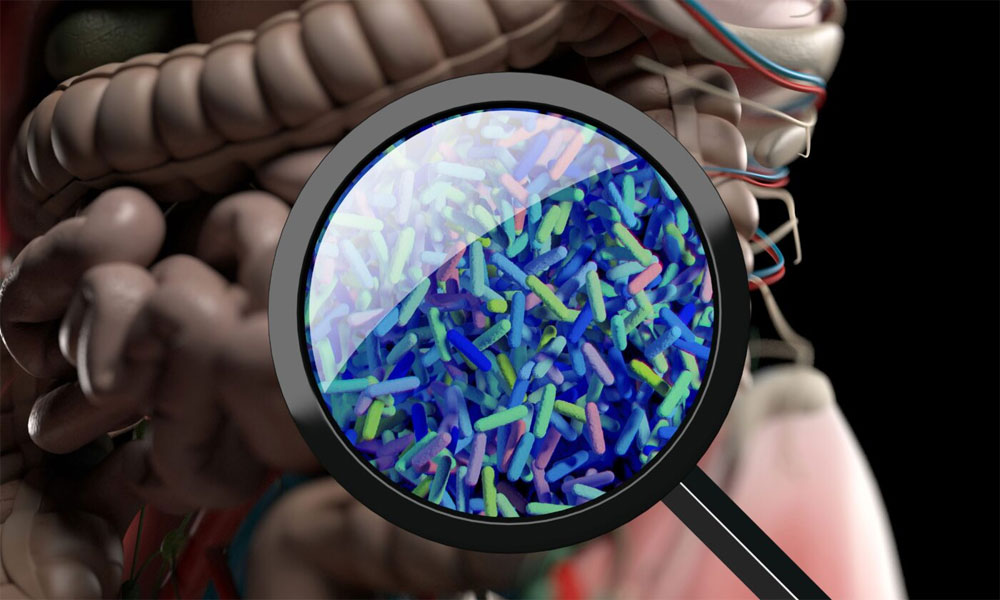Researchers Discover Over 142,000 Virus Species in the Gut Microbiome

Researchers at Wellcome Sanger Institute and European Bioinformatics Institute (EMBL-EBI) have recognized over 142,000 virus species in the intestine. Over half of them have by no means been detected till this examine. This could seem to be many viruses, nevertheless it pales in comparability to the complete quantity on our planet.
According to research, an estimated ten nonillion (10 to the thirty first energy) individual viruses live on Earth. This equates to at least one virus for each star in the universe, 100 million instances over. However, most of them don’t pose a risk to people; in reality, some are useful to our intestine microbiome. Scientists have simply begun to grasp how intestine micro organism have an effect on people and the way we will enhance our microbiome.
The paper revealed in February of 2021 in Cell accommodates an evaluation of over 28,000 intestine microbiome samples collected all through the world. The researchers discovered an unexpectedly excessive quantity and variety of viruses in numerous elements of the globe. This knowledge will spawn new analysis about how viruses in the human intestine influence our health.
The wonderful human intestine microbiome
No one refuses a bar of wealthy and indulgent chocolate, however are all types of sweets good for you? On this World Chocolate Day, it’s time to disclose all of it.
Who doesn’t love indulging in a bar of wealthy, creamy chocolate? Didn’t you simply drool at the considered it? We guess you probably did! That’s as a result of chocolate does that to you. Well, it’s time for us to depart our fantasy world and step into actuality. But have you ever ever puzzled why this dessert makes individuals go weak in the knees?
The answer is endorphins. When you take pleasure in your favorite bar, your body releases sure hormones that uplift your temper nearly immediately. But let’s keep in mind — this is all due to the lethal mixture of fats, sugar and salt. And though it makes you are feeling nice at that time, you find yourself piling on the energy and feeling worse, when your blood sugar ranges crash.
But can chocolate be eaten with out guilt? Is it even attainable for it to be healthy? The answer is YES. It all relies on the kind of chocolate you eat. Of course, all of us have our preferences in terms of chocolate. There are some who love darkish chocolate, others get a rush with good previous milk chocolate. But the truth is not every part is good for you.
Not simply you, however your mum wants milk chocolate too. On this World Chocolate Day, it’s time to grasp which one is considerably more healthy than the relaxation. Ready? Let’s go!
It’s darkish chocolate all the means
Of course, we all the time knew this. Didn’t we? Dark chocolate won’t style as scrumptiousas the others, however everyone knows how good it is. But why so? That’s due to the quantity offlavonoids and antioxidants it incorporates. These are chemical compounds which can be discovered inside the cocoa seed.Flavonoids are phytochemicals that assist to cut back the threat of coronary heart illness.
Not simply that,they decrease the threat of most cancers and reduce the incidence of blood clotting by decreasingplatelet accumulation. On the different hand, antioxidants are useful to build a powerful immunesystem. They additionally scale back the influence of free radicals, which are related to untimelygrowing older and most cancers.
Moreover, darkish chocolate incorporates 35% non-fat chocolate liquor, and has extra flavonoidsand antioxidants than different varieties of chocolate. Is your battery at 2%? Dark chocolate may very well be your answer.
How about different sweets?
Most individuals love milk chocolate, however guess what? It has 12% entire milk, and subsequently, hasextra fats content material than darkish. Plus, the flavonoids and antioxidant content material is additionally a lot decrease,which means it actually isn’t as healthy. It would possibly sound unusual, however this chocolate has no cocoa,and the highest sugar content material.
All in all, it’s important to keep in mind that the larger the cocoa proportion, the extra flavonoidsand antioxidants there are, the higher the health advantages. So, if you’re searching fora bar that’s actually healthy– go along with one which has at the least 70% cocoa.
So women, now that you understand— it’s time to dive deep right into a bar of darkish chocolate. Enjoy this deal withwith none guilt!
The human intestine homes a extremely various setting full of numerous micro organism and viruses. In reality, lots of of 1000’s of viruses, known as bacteriophages, stay in the intestine and might infect micro organism. Scientists have just lately found how intestine dysbiosis may cause weight problems, diabetes, abdomen points, and even allergy symptoms. However, they’ve simply scratched the floor in understanding the complicated human intestine and its impacts on our health.
In this examine, researchers discovered over 70,000 virus species residing in the intestine which have by no means been recognized earlier than. They used a DNA-sequencing methodology known as metagenomics to determine and categorize the virus species. Researchers from the two institutes analyzed 28,060 public human intestine metagenomes and a pair of,898 bacterial isolate genomes from the intestine. From this huge evaluation, researchers recognized about 142,000 virus species in the human microbiome.
Researchers hope to study extra about how the virus species have an effect on human health.
Most of the viruses residing in the intestine are innocent to people. We want them to outlive, as they maintain essential genetic materials that we have to operate. As many species haven’t been recognized till now, extra analysis is required to grasp them higher.
Dr. Alexandre Almeida, Postdoctoral Fellow at EMBL-EBI and the Wellcome Sanger Institute, stated: “It’s important to remember that not all viruses are harmful, but represent an integral component of the gut ecosystem. For one thing, most of the viruses we found have DNA as their genetic material, which is different from the pathogens most people know, such as SARS-CoV-2 or Zika, which are RNA viruses.
Secondly, these samples came mainly from healthy individuals who didn’t share any specific diseases. It’s fascinating to see how many unknown species live in our gut and to try and unravel the link between them and human health.”
Among the 140,000 virus species, researchers discovered a brand new, extremely pervasive clade – a bunch of viruses with a standard ancestor. The scientists referred to it as the Gubaphage, which they recognized as the second most prevalent clade in the intestine. The crAssphage, discovered in 2014, is the most ubiquitous; some research estimate that 73-77% of people have it.
Both viruses seem to contaminate comparable strains of intestine micro organism. However, researchers might want to do extra research to grasp exactly how the Gubaphage features. They consider this examine will pave the manner for essential discoveries in the future.
How the bacteriophage virus species can deal with illnesses and forestall foodborne sickness
Dr. Luis F. Camarillo-Guerrero, the first writer of the examine from the Wellcome Sanger Institute, stated: “An important aspect of our work was to ensure that the reconstructed viral genomes were of the highest quality.
A stringent quality control pipeline coupled with a machine learning approach enabled us to mitigate contamination and obtain highly complete viral genomes. High-quality viral genomes pave the way to understand better what role viruses play in our gut microbiome, including the discovery of new treatments such as antimicrobials from bacteriophage origin.”
They recorded the outcomes in the Gut Phage Database (GPD). This database accommodates an organized catalog of 142,809 non-redundant phage genomes. Researchers can seek advice from this when learning bacteriophages and the way they influence the human intestine and our health.
Dr. Trevor Lawley, the senior writer of the examine from the Wellcome Sanger Institute, stated: “Bacteriophage research is currently experiencing a renaissance. This high-quality, large-scale catalog of human gut viruses comes at the right time to serve as a blueprint to guide ecological and evolutionary analysis in future virome studies.”
Previous research on this topic foretold this consequence
Researchers from the University of Pittsburgh found firsthand how the bacteriophage virus species might deal with illness just a few years in the past. They efficiently handled 15-year-old cystic fibrosis affected person Isabelle Carnell-Holdaway, who’d been battling a drug-resistant Mycobacterium abscessus an infection half her life. While her an infection isn’t cured, the bacteriophage remedies appear to have made it extra manageable. The analysis was revealed in the journal Nature Medicine in May 2019.
A 2017 article by Veerasak Srisuknimit on the Harvard University blog wrote, “Now that more and more bacteria have developed resistance to antibiotics, scientists around the world have a renewed interest in phages. The European Union invested 5 million euros in Phagoburn, a project that studies the use of phages to prevent skin infections in burn victims.
In the USA, the FDA approved ListShield, a food addictive containing phages that kill Listeria monocytogenes, one of the most virulent foodborne pathogens and one cause of meningitis. Currently, many clinical trials using phage to treat or prevent bacterial infections such as tuberculosis and MRSA are undergoing.”
Final ideas: Scientists discovered over 140,000 virus species in the human intestine
In this groundbreaking examine, researchers recognized over 70,000 viral species which have by no means earlier than been found. They say that almost all of them are usually not pathogens however maintain DNA integral to a functioning microbiome.
Researchers consider that future research will present much more clues about how these viral species have an effect on us. Indeed, they consider future initiatives will uncover much more virus species in the intestine.












